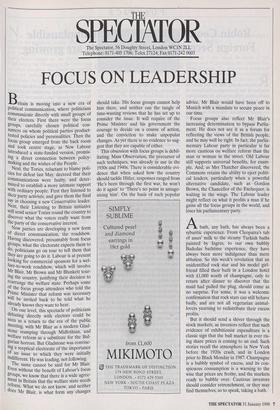SPECT THE AT OR The Spectator, 56 Doughty Street, London WC1N 2LL
Telephone: 0171-405 1706; Telex 27124; Fax 0171-242 0603
FOCUS ON LEADERSHIP
Britain is moving into a new era of Political communication, where politicians communicate directly with small groups of their electors. First there were the focus groups, carefully chosen political con- sumers on whom political parties product- tested policies and personalities. Then the focus group emerged from the back room .and took centre stage, as New Labour introduced a state-funded version, promis- ing a direct connection between policy- making and the wishes of the People. . Next, the Tories, reluctant to blame poli- cies for defeat last May, decreed that their communications were faulty, and deter- mined to establish a more intimate rapport With ordinary people. First they listened to their party activists, and gave them the final say in choosing a new Conservative leader. Next, their Listening to Britain initiative Will send senior Tories round the country to discover what the voters really want from the party of the conservative interest. Now parties are developing a new form of direct communication, the roadshow. Having discovered, presumably from focus groups, what the electorate expects them to do, politicians go on tour to tell them that they are going to do it. Labour is at present looking for commercial sponsors for a wel- fare-to-work roadshow, which will involve Mr Blair, Mr Brown and Mr Blunkett tour- ing the country, justifying their decision to rearrange the welfare state. Perhaps some of the focus group attendees who told the Prime Minister that reform was necessary Will be invited back to be told what he already knows they want to hear. On one level, this spectacle of politicians debating directly with electors could be seen as a return to the era of the public meeting, with Mr Blair as a modern Glad- stone stumping through Midlothian, and Welfare reform as a substitute for the Bul- garian horrors. But Gladstone was convinc- ing a sceptical electorate of the importance Of an issue to which they were initially indifferent He was leading, not following.. _ The same cannot be said for Mr Blair. Even without the benefit of Labour's focus groups, we know that there is a wide agree- ment in Britain that the welfare state needs reform. What we do not know, and neither does Mr Blair, is what form any changes should take. His focus groups cannot help him there, and neither can the tangle of time-wasting reviews that he has set up to consider the issue. It will require of the Prime Minister and his government the courage to decide on a course of action, and the conviction to make unpopular changes. As yet there is no evidence to sug- gest that they are capable of either.
This obsession with focus groups is debil- itating. Mass Observation, the precursor of such techniques, was already in use in the 1930s and 1940s. There is considerable evi- dence that when asked how the country should tackle Hitler, responses ranged from 'He's been through the first war, he won't do it again' to 'There's no point in antago- nising him'. On the basis of such popular advice, Mr Blair would have been off to Munich with a mandate to secure peace in our time.
Focus groups also reflect Mr Blair's increasing determination to bypass Parlia- ment. He does not see it as a forum for reflecting the views of the British people, and he may well be right. In fact, the parlia- mentary Labour party in particular is far more cautious on welfare reform than the man or woman in the street. Old Labour still supports universal benefits, for exam- ple. And, as Mrs Thatcher discovered, the Commons retains the ability to eject politi- cal leaders, particularly when a powerful alternative candidate, such as Gordon Brown, the Chancellor of the Exchequer, is waiting in the wings. The Labour leader might reflect on what it profits a man if he gains all the focus groups in the world, and loses his parliamentary party.
Abath, any bath, has always been a sybaritic experience. From Cleopatra's tub of asses' milk to the steamy Turkish baths painted by Ingres, to our own bubbly Badedas bathtime experience, they have always been more indulgence than mere ablution. So this week's revelation that an unidentified rock star and his model girl- friend filled their bath in a London hotel with £1,000 worth of champagne, only to return after dinner to discover that the maid had pulled the plug, should come as no surprise. For some, it was a welcome confirmation that rock stars can still behave badly, and are not all vegetarian animal- lovers yearning to redistribute their excess profits.
But it should send a shiver through the stock markets, as investors reflect that such evidence of exhibitionist expenditure is a classic sign that the bull market in ever ris- ing share prices is coming to an end. Such stories recall the atmosphere in New York before the 1920s crash, and in London prior to Black Monday in 1987. Champagne is a bubbly symbol of excess, and its con- spicuous consumption is a warning to the wise that prices are frothy, and the markets ready to bubble over. Cautious investors should consider retrenchment, or they may find themselves, so to speak, taking a bath.


































































 Previous page
Previous page